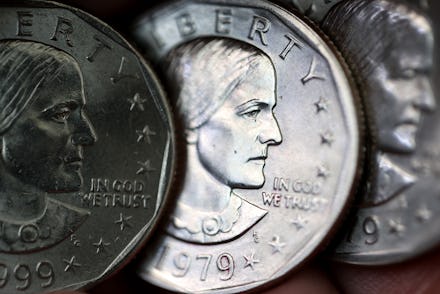Susan B. Anthony museum says "no thanks" to Trump's posthumous pardon of its namesake

When President Trump announced this week that he'd be pardoning long-dead suffragette Susan B. Anthony, who in 1872 was tried and convicted of voting in Rochester, New York, the White House lauded her as a "truly remarkable woman and an American hero."
The pardon, made as part of the administration's centennial celebration of the ratification of the 19th Amendment guaranteeing (in reality primarily white women) the right to vote, was immediately met with criticism from activists who cited Anthony's complicated history of racism, and the accolades she'd received over the years at the expense of other non-white suffragettes.
Among those pushing back on Trump's pardon was a surprising voice: that of Deborah Hughes, president and CEO of the National Susan B. Anthony Museum and House, who this week offered a two-part explanation for why she "must decline" the president's gesture toward her organization's namesake.
"Anthony wrote in her diary in 1873 that her trial for voting was 'The greatest outrage history ever witnessed,'" Hughes wrote in a statement posted to the museum's website. "She was not allowed to speak as a witness in her own defense, because she was a woman. At the conclusion of arguments, Judge Hunt dismissed the jury and pronounced her guilty."
"She was outraged to be denied a trial by jury," Hughes continued. "She proclaimed, 'I shall never pay a dollar of your unjust penalty.' To pay would have been to validate the proceedings. To pardon Susan B. Anthony does the same."
But Hughes's criticism of Trump's pardon went beyond the question of whether or not it affirmed her conviction in the first place. Instead, Hughes explained, "if one wants to honor Susan B. Anthony today, a clear stance against any form of voter suppression would be welcome."
Both Trump himself, as well as the GOP as a whole, have made voter suppression a key feature of modern conservatism, with efforts on both the state and federal levels which serve to minimize voting opportunities often disproportionately for communities of color. While Anthony herself may have had a deeply problematic relationship with concurrent efforts to ensure Black Americans were afforded the same voting rights being fought for by the suffragette movement, Hughes made clear in her rejection of Trump's pardon that the spirit of the voting rights movement is one of decisive inclusivity today.
She wrote:
Enforcement and expansion of the Voting Rights Act of 1965 would be celebrated, we must assure that states respect the 14th, 15th, and 19th Amendments to the United States Constitution. Support for the Equal Rights Amendment would be well received. Advocacy for human rights for all would be splendid. Anthony was also a strong proponent of sex education, fair labor practices, excellent public education, equal pay for equal work, and elimination of all forms of discrimination.
Hughes ended her pointed rejection of Trump's pardon with an offer — one which the president is likely to ignore.
"As the National Historic Landmark and Museum that has been interpreting her life and work for seventy-five years," Hughes wrote, "we would be delighted to share more."